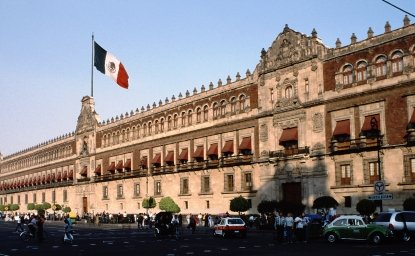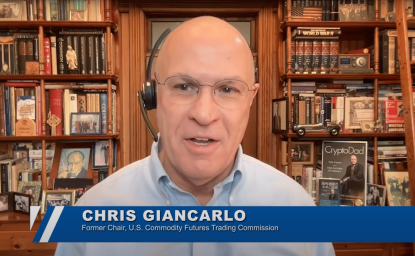Elections in Mexico can produce perplexing situations: “se cayó el sistema;” “voto por voto, casilla por casilla.” In the Mexican diaspora, elections create paradoxes of their own.
For Mexico’s 2000 elections, then-candidate Vicente Fox visited Mexican immigrant neighborhoods in Los Angeles and Chicago, where he rode a horse through the streets of South Lawndale, better known by its residents as La Villita.[1] Notably, at the time of his visit, Mexican citizens living outside of Mexico did not have the right to vote: Fox had traveled to the U.S. to campaign among an entirely nonvoting constituency.
For the 2018 elections, two of the major presidential candidates, MORENA’s Andrés Manuel López Obrador and PAN’s Ricardo Anaya, have made visits to the U.S. In March, Anaya visited Los Angeles, where he met with business owners and promised the audience to defend DACA recipients, excoriated Trump’s “insults to our community” and assured them the Mexican migrant community is not alone: “We will be with them always.”[2] Last year, López Obrador toured eight U.S. cities including Chicago, where he denounced Trump’s “campaign of hatred against immigrants and against Mexico,” promising to provide lawyers to those facing deportation.[3] Notably, by this time, Mexicans living abroad had gained the right to vote; however it is now illegal for candidates to campaign outside of Mexico. By making these visits before officially inaugurating their campaigns, Anaya and López Obrador were complying with the letter of the law, but not the spirit.
What is going on? Whether voters or not, Mexicans living in the U.S. exert a powerful pull on Mexican politicians: roughly 1 in 10 Mexicans live outside of Mexico, 98% of them in the U.S. And whether legal or not, campaigning in the U.S. has been a staple of Mexican elections for decades, and is unlikely to stop anytime soon.
This tradition not only predates the extension of voting rights to the diaspora, it predates the end of Mexico’s era of one-party rule: in the 1988 elections, Cuauhtémoc Cárdenas, who lost in a suspicious vote count, campaigned in California and Illinois, seeking support for his insurgent candidacy against the then-hegemonic PRI. Both Cárdenas and Fox knew their supporters in the U.S. could not vote for them. Still, during Fox’s horseback ride through Chicago, he passed out phone cards and said something that has been repeated not only by Mexican politicians visiting the U.S. but also those from Guatemala, Haiti, Liberia, and Taiwan, as well as Turkish politicians visiting Germany and Romanian politicians visiting Spain: he told them to call their relatives back home and tell them to vote for him.[4]
There is no way of knowing how many did, however all indicators point to widespread support for Fox within the Mexican diaspora at the time. Mexican immigrants in California and Illinois held mock votes in conjunction with the 2000 elections, with Fox winning by wide margins. Following his election, the government fulfilled Fox’s campaign pledge to extend voting rights to Mexican citizens residing abroad, and diaspora voters have disproportionately supported the PAN candidate in the two elections since.

Source: National Electoral Institute, District Voting by Mexican Citizens Residing Abroad
The PAN’s advantage among Mexico’s diaspora voters is a reflection of diaspora political dynamics generally, in particular the tendency of diasporas to vote against the incumbent party at the time of migration. As the vote totals show, the partisan skew of Mexico’s diaspora voters is not so much pro-PAN as it is anti-PRI: the PRI, being in power for seven decades, produced seven decades of emigrants who associate that party with the reasons why they left.
Yet one cannot say that the Mexican diaspora as a whole supports any party: it is impossible to tell because turnout rates are so low. Among countries which grant voting rights to citizens residing abroad – today, the majority of countries – Mexico has long been famous for having one of the most restrictive overseas voting systems in the world. Until 2016, Mexicans who wished to vote from abroad had to return to Mexico to obtain documents to register. The process typically took two to three weeks, and thus even those migrants who were able to travel back home, typically for the holidays, were mostly unable to take the necessary time off. Registration required producing identification which many migrants – especially those with irregular immigration status, did not have, such as a passport or birth certificate.
The 2005 diaspora enfranchisement law – the same law which prohibited politicians from campaigning outside of Mexico, which they do anyway – was a careful compromise between the PAN, which controlled the presidency, and the PRI, which controlled the Chamber of Deputies where the bill originated, and which had blocked 19 previous attempts to extend voting rights abroad. The resulting law was thus highly circumscribed and reflected a traditional suspicion by previous Mexican governments of Mexican emigrants as being “too Americanized.” The fact that the diaspora electorate is perceived to skew so strongly against one party created a natural veto player for the extension of voting rights. The compromise thus limited the electoral fallout for the PRI, while reinforcing the perception of a diaspora that favors the PAN, as the few who were able to navigate the registration process were relatively elite.
A restrictive registration process has predictably produced extremely low voter turnout in the two elections in which Mexicans could vote from abroad: in the 2012 presidential election, just over 40,000 voted, by mail, from abroad.[5] This 1% turnout rate reinforces views in Mexico that Mexicans living abroad are uninterested in politics at home. Mexican media outlets routinely lambast the public expense of voting from abroad: a typical headline analyzing the diaspora vote in the 2012 presidential election was “Each vote from abroad cost close to 5,000 pesos” (US$375 at the time).[6]
This year, the Mexican diaspora vote can be predicted to broaden and diversify, thanks to electoral reforms that now permit Mexicans to register at consulates rather than having to travel back home, though the required documentation, such as birth certificates or passports, remains difficult for many to obtain. Diaspora voters can also now vote for senators and governors in their home states, a right that had already been extended by ten states starting with Michoacán in 2007. Following the closing of the registration window in April, 181,256 Mexicans living abroad had both registered and activated their voter ID cards allowing them to vote in July’s federal election. This number represents a threefold increase in diaspora voter registration from 2012.[7] Nevertheless, out of an estimated 4.2 million voting-age Mexican citizens residing abroad, this would be a turnout rate of less than 5%. And relative to a total nationwide electorate of 85 million, the diaspora will remain a relatively tiny constituency.
Nevertheless, small vote differences can swing elections. Nobody remembers this better than López Obrador, who disputed his loss in 2006 by a margin of just 244,000 votes. This would explain why the perennial candidate, who refused to visit the U.S. for that election, has now embraced the diaspora with enthusiasm. Having campaigned as a defender of the dignity of the Mexican nation at home and abroad, López Obrador has enjoyed a windfall of political dividends nearly every time President Trump opens his mouth. And while the PAN has historically been the primary beneficiary of the diaspora vote, this year’s larger and more economically diverse diaspora voter pool will be advantageous for the populist candidate.
Yet as the Mexican press often points out, the amount of money spent on the diaspora vote, both by the government and by candidates making expensive visits to the U.S., makes little sense from a cost-benefit perspective, if one measures the payoff in terms of votes. But politicians do not. Mexican politicians and party officials I interviewed had no illusions about the miniscule number of votes they expected to receive from the diaspora. When asked why they bother, all of them repeated two words: remittances and influence.
Mexicans in the U.S. send an enormous amount of money to relatives back home, totaling $28.7 billion in 2017. That money, politicians believe, buys them influence over relatives back home, a belief that is shared by politicians in other migrant-sending countries. “Families vote in blocs, and the head of the household influences the rest,” one Dominican party official told me. “If we get one Salvadoran in Washington to support us, that gives us five votes in El Salvador,” said a Salvadoran campaign strategist.
It turns out this isn’t really true: models I built based on polling data show that migrants in the U.S. don’t have an impact on the voting behavior of their relatives at home, though they do impact their behavior in other ways: their willingness to join political organizations, to proselytize for candidates they already support, and be active in politics generally. And remittances turn out to have an insignificant impact on their own, understandably given that they are a poor enforcement mechanism: remittance-senders have not been known to deny money to their loved ones on the suspicion that they voted the wrong way. Ultimately, it is family communication, not money, that influences voter behavior, and such communication is more likely to reinforce existing partisan sympathies shared among family members than to flip votes.[8]
Whether or not the diaspora vote turns out to be decisive this election – and it almost certainly will not – the Mexican diaspora will continue to flex its political muscles. Candidates at every level of government seek the favor of powerful hometown associations representing large local constituencies across the U.S.: federations of Zacatecanos in California, Michoacanos in Illinois, Poblanos in New York. Immigrants demand, and receive, services from Mexican consulates which take on responsibilities akin to those of governors in Mexico: the Mexican government has earmarked money for consulates to provide legal services to immigrants and help them acquire documentation for DACA.
And while their remittances may not buy them clout with their relatives, they do buy migrants clout with the government, whose rhetoric towards the diaspora has changed completely, from once denigrating them as traitors and pochos to today’s “heroes of the homeland,” as Anaya called his audience in Los Angeles.[9] Even the PRI, historically the least popular party for migrants, has evolved in both rhetoric and policy toward the diaspora. The most recent reforms to the registration process were made by the Peña Nieto government, a concession to a constituency previous PRI administrations had kept at arm’s length.
These reforms are a credit to forward-thinking officials, within Mexico’s parties and its sprawling bureaucracy, notably the National Elections Institute. Most credit, however, goes to the Mexican diaspora itself, which for years organized and ultimately extracted political rights from a government which had long been reluctant to grant them a voice.
About the Author
Michael A. Paarlberg is an assistant professor of political science at Virginia Commonwealth University, currently a postdoctoral fellow at the University of Pennsylvania’s Center for the Study of Ethnicity, Race, and Immigration, and an associate fellow at the Institute for Policy Studies. His forthcoming book is on diaspora politics in Mexico, El Salvador, and the Dominican Republic. Find his work at www.michaelpaarlberg.org, and follow him on Twitter @MPaarlberg.
The views expressed here are solely those of the author.
[1] “La Villita grita Viva México!” Los Angeles Times 11 September 2009.
[2] Cordero, Víctor. “Anaya se reúne con migrantes mexicanos en Los Ángeles.” Excelsior 3 March 2018.
[3] Vergara, Rosalía. “Confirma AMLO en Chicago que demandará a Trump cnte ONU y CIDH.” Proceso 20 February 2017.
[4] Aguirre, Alberto. “La batalla por el voto de los ausentes.” La Jornada 21 May 2000.
[5] Mexican National Election Institute, District Voting by Mexican Citizens Residing Abroad, 2012.
[6] Vargas, Miguel Angel. “Cada voto desde el extranjero costó cerca de 5,000 pesos.” ADN Político 11 July 2012.
[7] Corchado, Alfredo and Dianne Solis. “Number of Mexicans voting abroad falls way short of expectations – again.” Dallas News 10 May 2018.
[8] Paarlberg, Michael A. 2017. "Transnational Militancy: Diaspora Influence over Electoral Activity in Latin America." Comparative Politics 49 (4), 541-559.
[9] Arellano, Silvia and Selene Flores. “México no se pondrá de tapete de EU: Anaya a migrantes.” Milenio 3 March 2018.
Author

Mexico Institute
The Mexico Institute seeks to improve understanding, communication, and cooperation between Mexico and the United States by promoting original research, encouraging public discussion, and proposing policy options for enhancing the bilateral relationship. A binational Advisory Board, chaired by Luis Téllez and Earl Anthony Wayne, oversees the work of the Mexico Institute. Read more

Explore More
Browse Insights & Analysis
The Mexico Institute's 2018 Elections Guide



